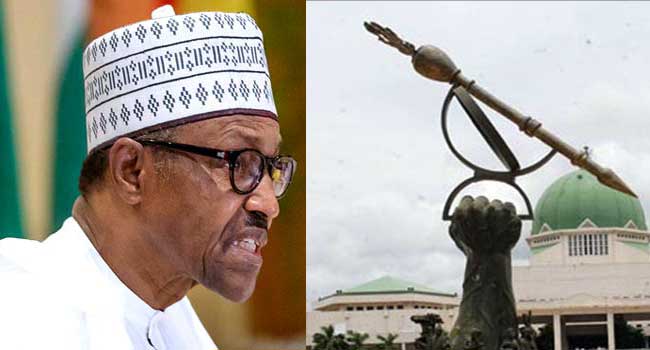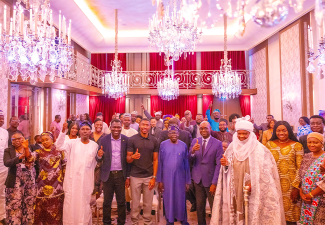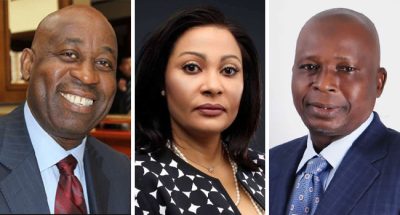*As bill bars ministers, commissioners from contesting parties’ primaries
*Says voters can’t contest candidate’s certificate in court
By KEMI KASUMU
The emerging issues indicating that the reworked Electoral Amended Bill has been done with more of lawmakers’ effort to protect certain vested interests may still make the presidential assent of it unsure, except the President and his eagle-eye team meticulously examine the new contents before signing or otherwise, The DEFENDER has gathered.
This is as the bill is saying that all political appointees in government would no longer be eligible, either as voting delegates or aspirants during the conventions or congresses of their political parties, something that, if the President goes ahead to sign, will affect even political appointees in his own government.
Keen followers of the new bill are already saying the presidential assent to the reworked bill must still not happen and that it can continue to be withheld for as long as its ambiguity remains unresolved and shrouded in self based interests of individuals.
Any electoral bill that stops members of a siting executive cabinet but not any siting lawmaker, though elected, from voting or contesting in primary elections of their parties, they say, cannot stand and call on President Buhari not to sign the bill, if it truly contains such suspicious clauses.
The feeling is that, there are some moneybag politicians, who see ambitions for presidential and other offices being nursed by some key ministers in the Buhari’s cabinet as threats to their aspirations and who have therefore hidden the clauses, barring them from seeking the nominations of their parties.
What this, therefore, means is that ministers, commissioners and other political appointees are expected to resign ahead of their parties’ primaries in order to be eligible to contest in the primaries, which is direct opposite of the existing order where political office holders resigned only after securing assurances of their parties to seek to be elected to offices.
A media report particularly said that top on the list of the aspiring appointees to be affected by this new amendment, if signed, are the Minister of Transportation, Rt. Hon. Chibuike Rotimi Amaechi, Minister of Interior, Ogbeni Rauf Aregbesola, and Minister of Works and Housing, Mr. Babatunde Fashola.
They are believed to have presidential ambitions, even though they have yet to declare their interests.
But by the provision at issue, political appointees are also barred from voting as delegates in a convention or seeking nomination in the primaries of the political parties they all own together.
Unlike what was obtainable in the past when most APC ministers and commissioners took leave of absence to contest their party’s primaries and later went back to their jobs after they lost, that grace is no longer available.
However, with the new amendment, if signed by the President, they would henceforth be required to vacate office completely before being eligible to contest.
The bill also advises aggrieved aspirants to seek redress at the Federal High Court if they suspect the political parties did not comply with the relevant provisions in the selection of candidates.
According to Clause 84 of the recommitted bill, “No political appointee at any level shall be a voting delegate or be voted for at the convention or congress of any political party for the purpose of the nomination of candidates for any election.
“Where a political party fails to comply with the provisions of this Act in the conduct of its primaries, its candidate for election shall not be included in the election for the particular position in issue.
“Notwithstanding the provisions of this Act or rules of a political party, an aspirant, who complains that any of the provisions of this Act and guidelines of a political party have not been complied with in the selection or nomination of a candidate of a political party for election, may apply to the Federal High Court for redress.
“Nothing in this section shall empower the courts to stop the holding of primaries or general election under this Act, pending the determination of a suit.”
But there appears to be a lacuna in the new law, which may encourage infringements on the inalienable rights of citizens to vie for elective offices.
The Supreme Court had pronounced at
different times that any law inconsistent with the provisions of the constitution is ultra vires and, to that extent, null and void.
Sources believe the clause is meant to clip the wings of the governors, who, through appointments, often control those who become automatic delegates and determine the outcome of congresses.
Sources further claimed that the idea was originally from the House of Representatives, pushed by a principal officer from Lagos as an agenda to serve some interests. The senate was said to have concurred, just to keep the “one house” refrain of the National Assembly.
But the fear being expressed by many is that, with a clause that clearly breaches the provision of the constitution, the president might be forced to veto the electoral act amendment bill again. If this happens, a new electoral law may not be ready for the 2023 elections.
The National Assembly had recently transmitted the new Electoral Act (Amendment) Bill to Buhari for assent, through the Clerk of the National Assembly, Olatunde Ojo. Before the latest transmission, Buhari had in December 2021, vetoed the former amendment bill, leading to a recommittal by the National Assembly.
There have been misgivings about the new amendment, fuelling speculations on whether or not the president would sign it into law. The latest speculation was stoked by rumours that some governors, especially, those of the ruling All Progressives Congress (APC), were not comfortable with the new amendment and had planned to prevail on the president to also veto it, as he did in the last one.
The harmonised version of the Electoral Bill recently passed by the legislature was considered the final agreed version by both Senate and House of Representatives on the amendment to Clause 84 of the bill.
In this clause, the direct, indirect and consensus modes of primary election
by political parties were included. This was after the controversy that trailed the different versions initially approved by the two chambers.
The senate had in its re-amended bill approved direct, indirect, and consensus primaries for the nomination of candidates by political parties, while the House only provided direct and indirect modes, saying the president did not speak about the consensus option, when he vetoed the previous bill.
But President of the Senate, Dr. Ahmad Lawan, while presiding at plenary, stated that both chambers had agreed to give a clear and sufficient definition for each mode of primary, and how they would be conducted.
Lawan explained that for the consensus method, the two chambers produced a clear-cut definition on how a consensus candidate would emerge.
Buhari had declined assent to the first amendment bill over the provision of direct primary as the only mode of choosing candidates by political parties.
The bill earlier passed by the National Assembly on November 18, 2021, provided that:
“A political party seeking to nominate candidates for elections under this bill shall hold direct primaries for aspirants to all elective positions, which shall be monitored by the commission.”
But Buhari, in declining assent, disclosed that he would only give assent to the bill if the lawmakers provided options beyond direct to indirect and even consensus modes for the conduct of primaries by political parties.
The president also cited several disadvantages of the provision to the system, including security and possible manipulation by incumbent office holders, who might be seeking re-election, as well as political parties’ inability to muster funds for it.
The DEFENDER/ThisDay




